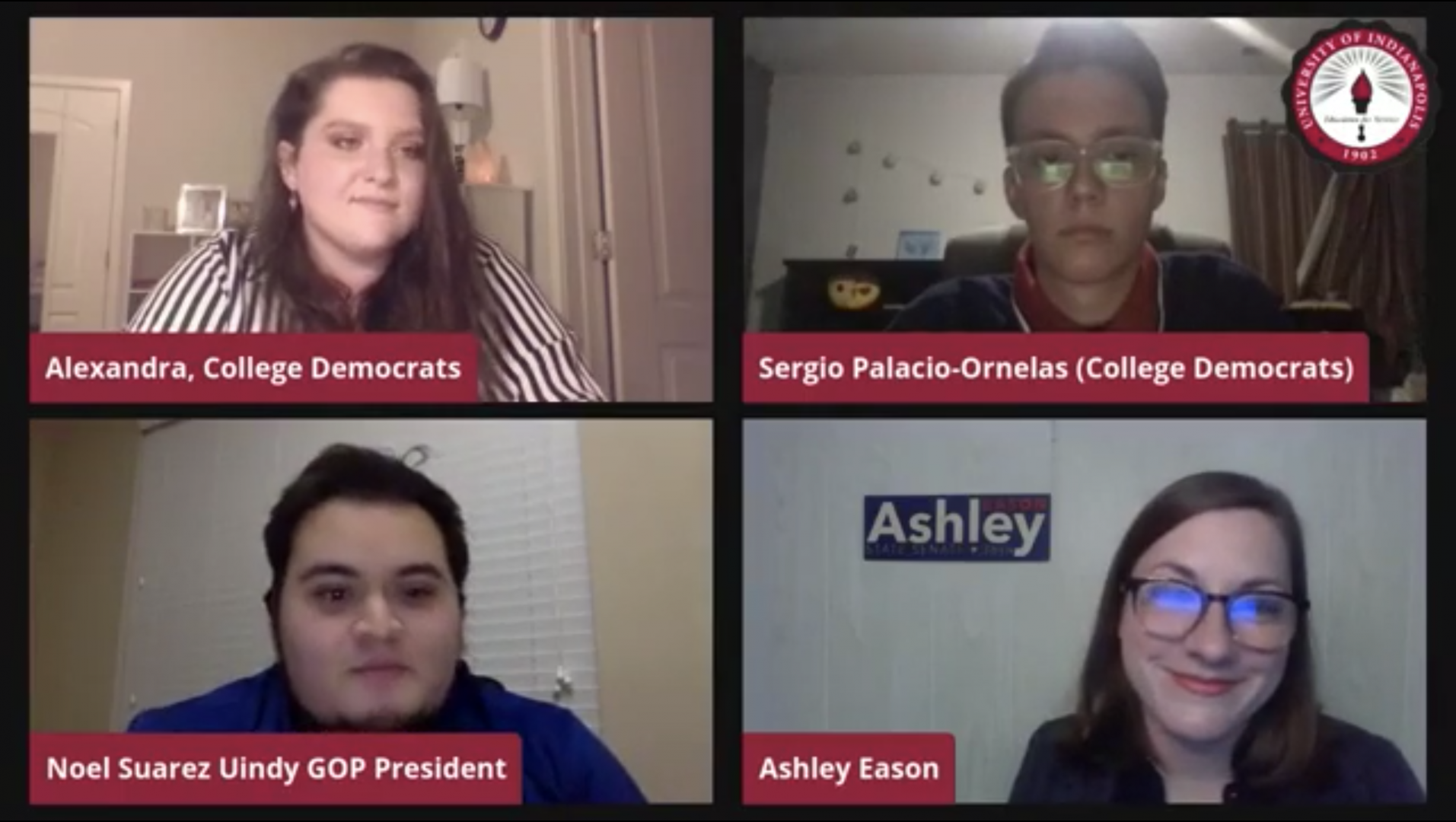The University of Indianapolis College Democrats and College Republicans groups joined forces for a virtual candidate forum with Indiana State Senate District 36 Democratic Candidate Ashley Eason on Oct. 13. The forum was livestreamed on Eason’s Facebook page and uploaded to her campaign’s YouTube channel. The virtual forum was moderated by UIndy College Democrats Vice President Alexandra Nickerson, College Democrats Secretary Sergio Palacio-Ornelas, and UIndy College Republicans President Noel Suarez.
Transparency and accountability in government is one of the most important things that needs to be worked on, Eason said. She was thrilled to be asked to speak at the forum, according to Eason.
“I think that all elected officials should be willing to speak to their voters and to their constituents,” Eason said.

Eason answered questions on the topics of policy, voter participation, health-care, COVID-19 and political divisiveness. A state senator’s job is to not only represent college students at the UIndy, but also voters across District 36 and the entire state, according to Eason. If elected into the legislature, Eason’s focus would be on jobs, education, and healthcare access, she said.
Each moderator prepared three questions to ask Eason, according to Nickerson. The College Democrats spoke with friends and volunteers on Eason’s campaign and did some research in order to find out what issues mattered most to college students, Nickerson said.
“… We all very much believe that local and state politics are almost more important than federal politics,” Nickerson said. “These are the laws and policies that are going to affect us as college students on a daily basis more than congressional policy ever would.”
In preparing the topics for their questions, the College Democrats decided on the issues of political engagement, healthcare, and the coronavirus response, according to Nickerson. They believed that questions on those issues would be the most key for students who wanted to learn more about the race before they cast their ballot, Nickerson said.
Suarez did some research on Eason’s background when formulating his questions, he said. He wanted them to be good questions that were hard for a purpose so that people could gain more information on Eason, according to Suarez.
“I was actually a little bit worried because I was the only one on the screen that was [a] Republican, and everyone else was left-leaning, so I was a little worried that they would perceive my questions to be not as easy as their questions, or maybe they would favor their questions a little bit more, but it went pretty well,” Suarez said. “I thought I might get some pushback from Eason based on my questions, but she was very professional and I really liked her answers and how she answered it.”
Sen. Jack Sandlin, the Republican candidate and the incumbent, was asked to be a part of the bipartisan forum, which was originally going to be a debate between Sandlin and Eason, but he declined to participate, according to Nickerson. The College Democrats decided that they wanted to go forward with the event anyway and the College Republicans agreed to remain as co-hosts, Nickerson said.
“We are incredibly pleased with how the event went,” Nickerson said. “Overall, we felt that the spirit of bipartisanship really made the event what it was. Both sides asked engaging and difficult questions, Ashley [Eason] handled them with an impressive amount of grace and honesty. She sent out a very clear dichotomy between what she wants to do and what Jack Sandlin is currently doing.”
Both the College Democrats and College Republicans would like to keep the success of the event going because they would like to maintain their bipartisanship, according to Suarez. They hope to keep creating student engagement so that students can get involved regardless of their political beliefs, Suarez said.
It’s important for college students to be involved in politics and elections because there is a prevailing idea that politics does not matter or affect their lives, Nickerson said. It’s more crucial now than ever for college students to be engaged in politics, according to Nickerson.
“If students care about potholes in Indianapolis, if students care about affording health insurance, if they care about student loan forgiveness, they’re [these issues] excellent reasons to be interested in politics,” Nickerson said. “Especially at the local level, local and state policies affect us every single day.”
College students should be involved in politics because their votes matter, Suarez said. Students have to weigh their options when voting, such as deciding whether or not it’s worth standing in line to vote when they have classes and other commitments, he said.
“It’s worth it to take time out of your day to go do it,” Suarez said. “It might seem inconvenient, but it’s really not, especially because your vote could matter, especially [in] local elections …. National elections are great, [but] I like local elections a little bit more because they do matter, especially if you look at the numbers.”
State and local races matter more than elections on the federal level because they affect day to day life, Eason said during the event. Local races from mayor to governor are what really affect our lives, she said.
“That’s why I’m running. I’m running as a neighbor from Bates-Hendricks, right around the corner from Fountain Square,” Eason said. “I chose to move to Indiana .… I love this community because when I had the opportunity to move here, I believed this was the kind of place if you showed up and you’re kind and you want to help, doors open to you, and that’s why I took a chance. I wouldn’t be doing this right now if that was not true. But more than that, I learned that the doors don’t open for all my neighbors the way they did for me. My job as a neighbor, as a citizen, and as a friend is to run, take my privilege and open doors for other people, not just for me.”







